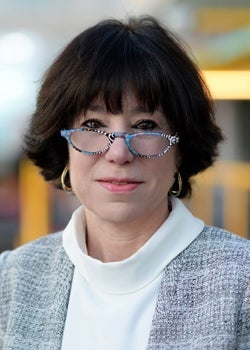Maura Grossman, a Cheriton School of Computer Science Research Professor, is using AI to make legal document review more effective and efficient

Maura R. Grossman is a practicing attorney in New York. In 2016, she joined the University of Waterloo’s David R. Cheriton School of Computer Science to further her research on the application of artificial intelligence to the field of law.
Her ground-breaking research has some people in the legal community feeling pretty threatened.
“Law is not a particularly innovative field,” says Grossman. “It’s based on precedent — looking backwards at what we did yesterday — so it’s slow to evolve and change.”
But with technological innovation affecting every industry, law is well on its way to becoming the next sector poised for disruption.
Advancing law with math
Grossman’s journey from being an attorney at a New York corporate law firm to a research professor in the David R. Cheriton School of Computer Science began with her focus on electronic discovery — the phase of litigation where the parties exchange digital documents and information. Traditionally, lawyers would perform an exhaustive manual review of electronically stored information (ESI), such as emails, word-processing files, text messages and social media. Digital information is extremely important as evidence in legal proceedings, and with almost all communications and transactions now being performed electronically, the sheer volume of ESI has increased dramatically, making manual review of it nearly impossible.

“There can be millions of pieces of information to comb through in the typical discovery process. TAR narrows that down, separating the wheat from the chaff,” says Grossman. “Lawyers train the algorithm to find what matters using supervised machine-learning, informed by relevance feedback, delivering results shown to be much faster and more accurate.”
“Unlike junior associates and contract attorneys, a computer does not get tired after lunch, doesn’t fight with its partner, can work around the clock, and makes accurate and consistent determinations,” explains Grossman.
Grossman has been a court-appointed special master and mediator in multiple, high-profile US federal cases. In 2018, prosecutors in New York proposed that she use TAR to conduct the initial privilege review of the materials seized by the FBI in the case against Michael Cohen, President Trump’s personal lawyer. There were millions of documents to review for privileged information, so Grossman and former US Magistrate Judge Frank Maas suggested the use of TAR to help manage the volume and speed up the process. Ultimately, the court decided to go in a different direction, but the government’s support for TAR in this highly scrutinized case raised the technology’s profile and has led to discussions about how the technology could play a wider role in future cases.
AI is a powerful tool — if we let go of our fear
Since TAR was accepted by the US courts in 2012 — now also in the UK, Ireland and Australia — it has been backed by mounting research, but skeptics still worry about its validity and reliability.
“I never believed there would be so much push-back,” says Grossman. “Not once we had the empirical evidence to show that it was better than accepted practice.”
Grossman notes that lawyers are not financially motivated to accept technological efficiencies that significantly reduce their billable hours, but also believes that TAR may be scary for some to accept at face value. Lawyers are not necessarily known for their technically savvy and may fear AI, and label it “dangerous,” if they do not understand it.
This is precisely why Grossman is passionate about the work she is doing at Waterloo. Being part of an ecosystem that encourages interdisciplinary thinking allows her to connect computer scientists with lawyers so they can learn from one another.
“I believe it is critical to bring together people who wouldn’t normally cross paths,” explains Grossman. “No one discipline can solve all our problems; we need diverse teams that work together to have a better output.” That is also why Grossman is enthusiastic about her new position as Director of Women in Computer Science. She hopes to encourage and support Waterloo’s female students and increase their numbers in the workforce.
Grossman’s course, Artificial Intelligence: Law, Ethics and Policy, is the first of its kind in North America. It brings together 15 graduate students from the School of Computer Science and 15 upper-class law students from Osgoode Hall Law School.
“I’m trying to raise the consciousness of both sets of students. The law students learn about the technologies they will be responsible for regulating, and the technologists learn about the ethical and policy imperatives surrounding the technologies they develop.” She adds, “more and more, law firms are hiring data scientists, and both the creators and users of technology need to be sensitive to the legal implications, such as bias in data.”
There is no doubt that AI will disrupt the field of law — it’s a powerful tool that lawyers are already beginning to use. Grossman hopes that by bridging the learning and research gap between lawyers and computer scientists, the legal industry can put their fears aside and embrace the AI revolution and innovation that is happening across all sectors.